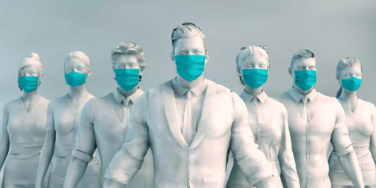Every day, I help guide people with cancer through one of the hardest experiences in their lives. As a patient advocate for The Mesothelioma Center, I serve patients blindsided by a malignant mesothelioma diagnosis, the rare cancer that gives asbestos its lethal reputation. I am well versed in the terrible physical effects of cancer, but I also have a close-up perspective of the emotional turmoil that accompanies cancer treatment.
Up to one-third of cancer patients are diagnosed with anxiety or depression. These afflictions are difficult to measure because of variation in terms between researchers and social stigma that lead to many cases going unreported. But when it comes to suicide—the ultimate consequence of ill mental health—the data are more straightforward.
According to research presented at the 2017 American Thoracic Society conference, patients with any type of cancer have a suicide rate 60% higher than for the general U.S. population. For lung cancer patients, the rate is four times higher than the baseline. The rate spikes sharply higher for men, older individuals, widows, and patients with metastatic disease.
Treatment Costs Drive Anxiety, Depression
It’s easy to imagine how having cancer could lead to anxiety and depression. But many professionals in the healthcare industry don’t realize the high cost of cancer treatment is the most frightening thing about cancer in America. In 2018, the American Society of Clinical Oncology reported the results from its National Cancer Opinion Survey. Of the hundreds of respondents who were cancer patients, 54% worried about dying from their disease, but almost 60% worried about the financial burden of treatment.
It’s a perfectly reasonable concern.
A JAMA Oncology study based on data from 2002–2012 reported average out-of-pocket costs for cancer patients on Medicare: Annual patient spending was $5,670 for patients who also had private insurance, $5,976 for patients with a Medicare Advantage Plan, and $8,115 for patients with only basic Medicare.
In 2018, researchers at the University of Rochester surveyed 542 cancer patients aged 70 to 96 to explore the consequences of this treatment-related financial burden. Nearly one-fifth of the respondents reported occasions where they had run out of money for food and housing or put off buying medications because of treatment expenses.
As professionals in the healthcare industry, we must all do our part to raise awareness of support services, so cancer patients know they have somewhere to turn for mental health counseling or financial assistance. We must also advocate for change in the U.S. healthcare industry to remove the barriers to mental and financial well-being for cancer patients.










